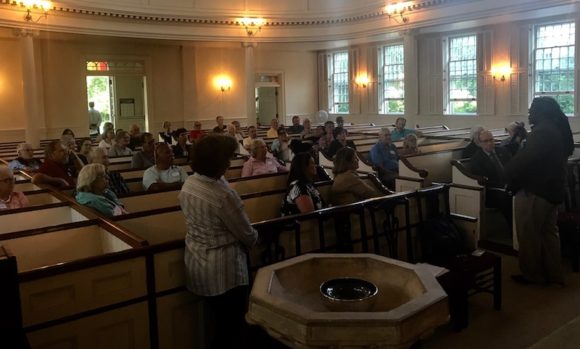
About 60 community leaders and citizens, including members of the clergy from both New London and Middlesex Counties, attended a “Conversation on the State Budget,” Monday evening at the First Congregational Church of Old Lyme (FCCOL)
Only two state-elected representatives attended out of a total of the 55 senators and representatives invited. State Rep. Devin Carney, (R-23rd), whose district includes Lyme, Old Lyme, Old Saybrook and the southern segment of Westbrook, and State Rep. Melissa Ziobron (R- 34th), whose district includes East Haddam, East Hampton and Colchester, attended.
Carney and Ziobron answered questions from the audience carefully and thoughtfully, shedding light on how the budget process is proceeding. They also listened attentively to concerns raised by many of those who attended.
Chief among those concerns was expressing the importance of maintaining appropriate and adequate state funding for programs that are critical to those most in need throughout the state. In light of pending federal cuts to health care programs, maintaining the State of Connecticut’s support of medical care for the low-income and elderly was a constant theme of the evening.
Many of those who attended made it clear that, if the priorities and commitment to support the neediest among us were clearly articulated, paying higher taxes would seem both an appropriate and honorable response. Cutting taxes was not considered a priority. Several speakers commented how it is a privilege to live in this area and, as a consequence, there should be an expectation to pay a fair share to compensate for those who shoulder unreasonable burdens in Connecticut’s cities.
There was a lively discussion about the state pension-funding crisis during which former State Senator Melodie Peters reminded the audience that state employees had paid into those funds over many years. She expressed her firm opinion that it is critical now to honor the state’s commitments to those people.
There was almost universal consensus that the state is in a challenging place in terms of the budget and compromise on all sides in the legislature is imperative. Frequently, questions were raised about why the two parties seem so crippled by partisanship.
A wide-ranging discussion about increasing state revenues ensued. Questions were raised regarding the possibility of re-implementing tolls and taxing sugary drinks. Another audience member asked, “Could we add a small fee onto our car registrations to fund our state parks and their employees?” A third speaker questioned whether the state could consider raising taxes on those in upper income brackets.
The subject of the questions then moved to business with one audience member asking, “Can we incentivize businesses to come to this state?” while another questioned, “Is it possible to raise the minimum wage so that people in the state have more ability to participate in our economy?”
The Rev. John Selders of Amistad Congregational Church in Hartford, Conn., who serves as coordinator of the Moral Monday, Conn., program, and Moral Monday Board Member Pamela Selders helped to lead the discussions, along with FCCOL Senior Associate Minister Carleen Gerber